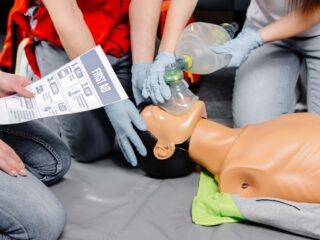
Your week has been brutal. Deadlines stacked up, your partner’s been distant, and sleep feels impossible. Friday evening arrives, and that bottle of wine looks like salvation. One glass becomes two, then three. For a few hours, the weight lifts.
But here’s what nobody mentions: alcohol doesn’t fix anything. That temporary emotional lift comes with a steep price attached to your mental health. The substance manipulating your mood tonight will steal even more emotional stability tomorrow and beyond if this pattern continues.
Thousands find themselves trapped in this cycle, using alcohol to manage stress or anxiety without realizing they’re making everything worse. Professional support through addiction rehab offers a genuine path forward, but first you need to know what’s actually happening inside your brain when you drink.
The Brain Chemistry Behind Your Changing Moods
Think of your brain as an orchestra. Dozens of chemical messengers—neurotransmitters—work in harmony to regulate your emotions, energy, and mental clarity. Alcohol barges in like someone who’s never held a conductor’s baton, throwing everything off tempo.
GABA is your brain’s primary calming signal. Alcohol amplifies it significantly, flooding your system with artificial relaxation. This explains why that first drink loosens you up and quiets racing thoughts. Your nervous system slows down. Anxiety backs off.
Simultaneously, alcohol blocks glutamate—the brain’s wake-up call. Less glutamate means impaired judgment, fuzzy thinking, and memory gaps. You’ve lived this if you’ve ever done something while drinking and thought “Why on earth did I say that?” the next morning.
Dopamine spikes when alcohol hits your system. This “reward” chemical creates that warm, pleasant buzz. Your brain loves dopamine. It remembers: alcohol equals good feelings. This neurological stamp is precisely what makes alcohol so habit-forming.
But here’s where things get ugly. Your brain recognizes the artificial flood of GABA and dopamine as abnormal. So it adapts. GABA receptors become less sensitive. Dopamine production drops. You need more alcohol to feel the same relief. The trap closes before you realize you’re caught.
Serotonin regulation goes haywire too. This mood-stabilizing neurotransmitter gets disrupted with regular drinking, leading to depression and anxiety. Your brain’s emotional thermostat breaks, leaving you vulnerable to wild mood swings you can’t control.
The Emotional Rollercoaster Nobody Warns You About
The first couple drinks feel magical. Inhibitions melt away. Social anxiety takes a back seat. You feel confident, maybe even charming. This is the part everyone talks about.
Then the mask slips.
Three drinks in, emotions you’ve been suppressing bubble up without warning. Anger flares. Sadness crashes over you. Or worse—you feel nothing at all, just numb. Your emotional range narrows to either explosive or empty.
Your partner makes an innocent comment. Tonight? Fighting words. You say things you don’t mean. The next morning brings “hangxiety”—the anxiety spike that follows drinking. Your nervous system rebounds from alcohol’s depressant effects, leaving you jittery, paranoid, and convinced everyone from last night hates you.
Regular drinking amplifies these swings. Tuesday afternoon brings irritability. Thursday, unexpected tears. Friday, you snap at your kids. The emotional stability you once took for granted evaporates.
Sleep gets destroyed too. Your brain never reaches the deep, restorative stages it needs. You might sleep seven hours but wake up feeling like you got four. Poor sleep intensifies emotional instability, creating another vicious loop.
Memory becomes unreliable. Did you send that text? What exactly did you say? Gaps in your emotional memory make processing feelings nearly impossible. You can’t learn from experiences you don’t fully remember.
When Self-Medication Becomes Self-Sabotage
Depression feels suffocating. Anxiety makes your chest tight. Trauma memories intrude when you’re trying to sleep. Alcohol promises to quiet all of it. And it does—temporarily. For a few hours, you get relief.
This is where countless people get trapped. Three drinks make panic attacks stop. Wine silences the critical voice. Beer helps you forget why you’re sad. The relief feels real because it is real, at least for those few hours.
But alcohol doesn’t heal emotional wounds. Worse, it actively makes mental health conditions deteriorate over time.
Research consistently shows that heavy drinking worsens depression. The temporary serotonin boost gives way to longer periods of low mood. Anxiety disorders intensify as your nervous system becomes dysregulated. PTSD symptoms flare during withdrawal. What started as your coping mechanism becomes another problem you need to cope with.
The cycle tightens: You feel awful, so you drink. Drinking makes you feel worse. Feeling worse makes you drink more. Each rotation digs the hole deeper. The space between drinks gets shorter. The amount you need gets larger.
Relationships crack under the pressure. Your partner notices the mood swings and broken promises. Friends stop inviting you places. Kids walk on eggshells. Professional performance slides. These losses compound your emotional pain, reinforcing the need to drink.
Warning signs include drinking alone regularly, needing alcohol to feel “normal,” experiencing blackouts, hiding your drinking, and persistent mood problems that weren’t present before.
Breaking Free From the Emotional Trap
Recognizing the pattern is genuinely difficult when you’re living inside it. Alcohol warps your perception, convincing you that it’s solving problems rather than creating them. That’s why outside perspective matters so much.
Your emotions won’t heal overnight if you stop drinking. Your brain needs time to rebalance its chemistry, rebuild damaged pathways, and remember how to regulate mood naturally. This process typically takes weeks to months, depending on how long you’ve been drinking. The first few weeks can feel raw as suppressed emotions resurface.
But emotional recovery is absolutely possible. People who get proper support report that their mood stabilizes, anxiety lessens, and they rediscover emotional range they’d forgotten existed. Connection with loved ones feels real again.
Professional support makes a substantial difference in success rates. Trying to quit alone while your brain chemistry rebels and your coping skills remain undeveloped rarely works long-term. Structured treatment addresses both the physical dependence and the emotional patterns that drove you to alcohol in the first place.
The Canadian Centre for Addictions knows that alcohol dependency isn’t just about the substance, it’s about the emotional pain underneath. Our programs help you develop healthier coping strategies, process difficult feelings without numbing them, and rebuild the emotional resilience that alcohol stole from you.
Your emotional well-being matters. The anxiety, depression, and mood instability you’re experiencing aren’t permanent character flaws—they’re consequences of alcohol’s impact on your brain. With proper support, you can reclaim your emotional health. Many Canadians have walked this path successfully.
If you’re ready to explore what recovery could look like for you, reach out to us at 1-855-499-9446. Your emotional well-being deserves better than what alcohol can offer.












